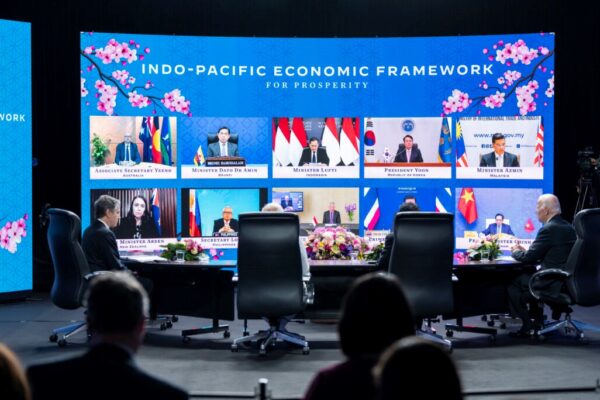This week, the Minister for Trade and Tourism Senator Don Farrell has been attending the first in-person ministerial meeting of the new Indo-Pacific Economic Framework (IPEF). He and Ministers from 13 other partners across the Indo-Pacific have met in Los Angeles. The formal launch of negotiations on 09 September followed Australia’s decision to join IPEF as a founding member four months ago.
In a media release yesterday (12 September 2022), Mr Farrell said, “Launching IPEF negotiations is a significant step in the future of greater economic cooperation in the Indo-Pacific region. It was a privilege to work so closely and constructively last week with Ministers from across the region to agree IPEF’s forward-leaning and ambitious scope and objectives.”
IPEF brings together some of the largest and most dynamic regional economies, accounting for around 40% of global GDP and including eight of Australia’s top ten merchandise trading partners. Australia is a founding member of IPEF, alongside Brunei Darussalam, Fiji, India, Indonesia, Japan, Malaysia, New Zealand, the Philippines, Republic of Korea, Singapore, Thailand, the United States and Vietnam.
IPEF members agreed that negotiations would cover a range of new and emerging issues – the four core issues being: trade; supply chains; clean energy; and tax and anti-corruption.
Regarding the first two of these, the joint Ministerial Statement issued at the launch of IPEF included the following paragraphs:
“Trade: We seek to build high-standard, inclusive, free, and fair trade commitments and develop new and creative approaches in trade and technology policy that advance a broad set of objectives that fuels economic activity and investment, promotes sustainable and inclusive economic growth, and benefits workers and consumers. Our efforts include, but are not limited to, cooperation in the digital economy.
“Supply Chains: We are committed to improving transparency, diversity, security, and sustainability in our supply chains to make them more resilient and well-integrated. We seek to coordinate crisis response measures; expand cooperation to better prepare for and mitigate the effects of disruptions to better ensure business continuity; improve logistical efficiency and support; and ensure access to key raw and processed materials, semiconductors, critical minerals, and clean energy technology.”
Through IPEF, Australia has the potential to attract more investment, cut red tape, and address major challenges brought about by climate change and supply chain disruptions, while finding new opportunities for Australian businesses and workers.
IPEF will complement existing regional economic architecture, build on Australia’s extensive network of regional and free trade agreements, and support the global rules-based trading system.
To quote another paragraph for the statement made at the launch back in May:
“We invite participation from additional Indo-Pacific partners that share our goals, interests, and ambitions for the region. We are committed to collaborating with our framework partners in a manner that acknowledges the importance of technical assistance and capacity building, allows us to maintain a flexible approach, and delivers tangible benefits for our peoples.”
Australian stakeholders are encouraged to have their say on the development of this modern regional framework via the Department of Foreign Affairs and Trade (DFAT) website.
For assistance with all your trade and shipping activities, talk to us here at Colless Young. As licensed Customs Brokers and International Freight Forwarders, we professionally handle all your consignments, both sea cargo and airfreight. We provide a complete range of import and export services, covering quarantine treatments, trucking and warehousing. We are based in Brisbane and offer logistics facilities through all Australian ports and airports.

